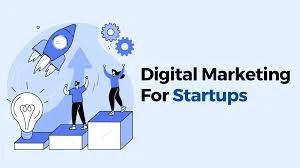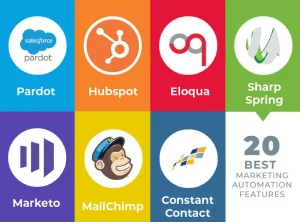Marketing Automation for Startups: Tools and Benefits
We are explaining here the importance of marketing automation when running a startup, It often feels like juggling a hundred tasks at once, especially regarding marketing. You need to build brand awareness, nurture leads, and drive sales with limited resources. That’s where marketing automation comes in, offering tools and strategies to streamline repetitive tasks, save time, and grow your business faster.
Let’s dive into marketing automation, why it’s perfect for startups, its benefits, and the tools you can use to get started.
What is Marketing Automation?
Marketing automation is the use of software to handle repetitive marketing tasks like sending emails, managing social media, tracking customer behavior, and more. Instead of doing everything manually, automation allows startups to focus on strategy while the system handles the nitty-gritty.
Think of it as hiring a virtual assistant who works 24/7 to keep your marketing efforts on track!
Why Startups Need Marketing Automation
As a startup, you’re often short on time, budget, and manpower. Marketing automation offers a solution by allowing you to:
- Do More with Less: One person can manage tasks that would usually require an entire team.
- Personalize Efforts: Tailor messages to your audience without spending hours crafting individual emails.
- Scale Quickly: As your business grows, automation grows with no extra overhead required.
For example, instead of manually sending welcome emails to every new subscriber, automation tools can instantly handle this for you, ensuring timely and consistent communication.
Benefits of Marketing Automation for Startups
1. Saves Time and Resources
Automation handles repetitive tasks, freeing up your team to focus on creative strategies and high-value activities. Whether it’s scheduling social media posts or setting up email campaigns, you can accomplish more in less time.
Example: A restaurant startup can automate email reminders for customers who haven’t visited in a while, encouraging them to return with a discount.
2. Improves Lead Nurturing
Startups need to guide potential customers through the sales funnel, and automation makes this seamless. You can set up workflows to send targeted messages based on user behavior, like downloading an e-book or visiting your pricing page.
Why It Works: Personalized follow-ups keep your leads engaged and move them closer to conversion.
3. Enhances Customer Relationships
Automation allows startups to maintain consistent and timely communication. Whether it’s sending birthday greetings, order updates, or newsletters, staying in touch becomes effortless.
Pro Tip: Use tools like chatbots for real-time customer support to improve satisfaction and retention.
4. Provides Data-Driven Insights
Marketing automation platforms come with robust analytics features, offering insights into what’s working and what isn’t. Track metrics like email open rates, click-through rates, and conversion rates to refine your strategies.
Example: A SaaS startup can use analytics to identify which email campaigns drive the most sign-ups, then double down on similar strategies.
5. Boosts ROI
With automation, every marketing dollar works harder. By targeting the right audience at the right time with personalized messages, you can maximize conversions and reduce wasted efforts.
Top Marketing Automation Tools for Startups
1. Mailchimp
Best For: Email marketing.
Features: Automated email workflows, audience segmentation, analytics, and A/B testing.
Why Startups Love It: Easy to use and budget-friendly, making it ideal for small teams.
2. HubSpot
Best For: All-in-one marketing automation.
Features: Email marketing, CRM, social media management, and lead tracking.
Why Startups Love It: Combines marketing and sales tools in one platform.
3. Hootsuite
Best For: Social media scheduling and management.
Features: Automates post-scheduling, monitors engagement, and analyzes social performance.
Why Startups Love It: Simplifies managing multiple social accounts.
4. ActiveCampaign
Best For: Advanced email and customer experience automation.
Features: Drip campaigns, dynamic content, and lead scoring.
Why Startups Love It: Combines email marketing with CRM for a seamless workflow.
5. Zoho CRM
Best For: Small business customer relationship management.
Features: Automates lead management, email tracking, and task reminders.
Why Startups Love It: Affordable and scalable for growing teams.
How to Get Started with Marketing Automation
- Define Your Goals: Are you looking to increase email sign-ups, nurture leads, or improve customer retention? Set clear objectives to guide your strategy.
- Choose the Right Tool: Based on your budget and needs, pick a tool that aligns with your goals. Begin with the basics and broaden your scope as your business develops.
- Map the Customer Journey: Understand how customers interact with your brand and design automated workflows for each stage.
- Awareness: Send welcome emails to new subscribers.
- Consideration: Deliver product recommendations.
- Conversion: Offer discounts or free trials.
- Test and Optimize: Run A/B tests on your campaigns to find what works best. Use analytics to tweak your strategies for maximum impact.
Real-Life Example: A Startup Success Story
Imagine a fitness app startup that uses marketing automation to grow its user base.
They use Mailchimp to send welcome emails to new users.
ActiveCampaign nurtures leads by sharing workout tips and success stories.
Hootsuite automates their Instagram and Facebook posts, driving traffic to their app.
HubSpot tracks user behavior, helping the team understand which campaigns lead to app downloads.
The result? Increased engagement, higher downloads, and better ROI all without overwhelming their small team.
Conclusion
Marketing automation is a game changer for startups, enabling you to streamline operations, nurture leads, and build stronger customer relationships all while staying on budget. By leveraging the right tools and strategies, you can scale your marketing efforts effectively and focus on what truly matters: growing your business.



Leave a Reply